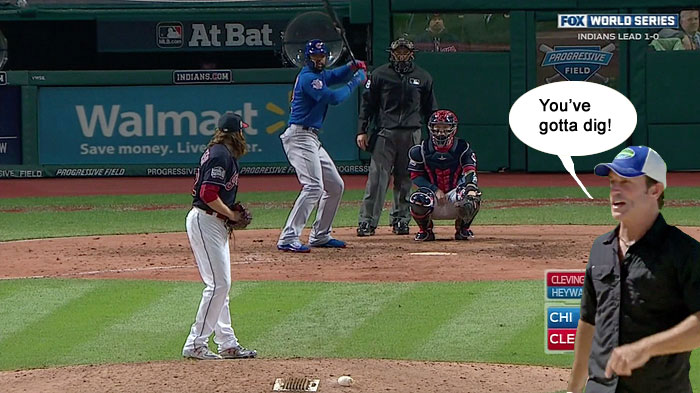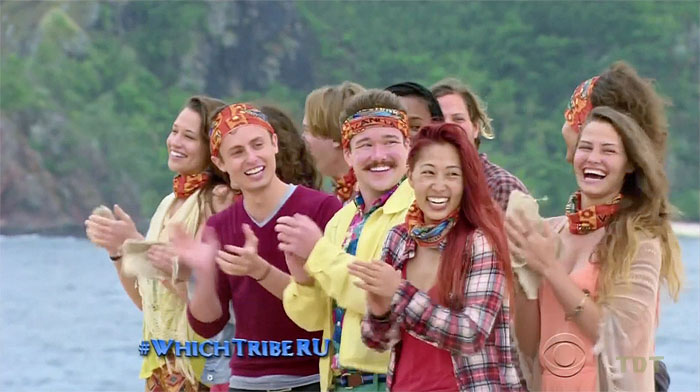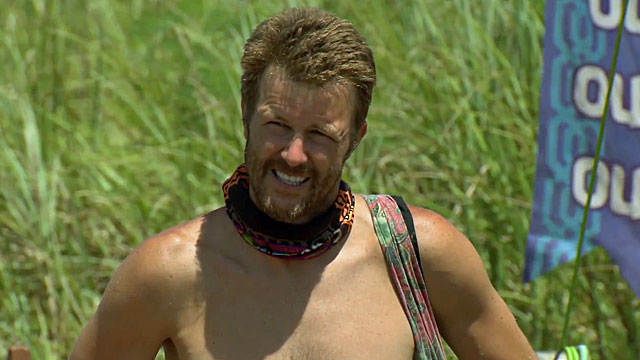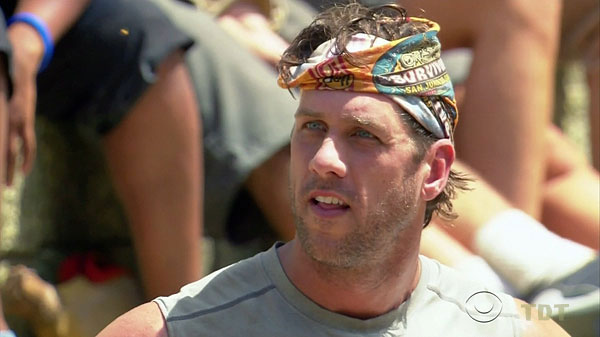

This picture was reused without the express written consent of Major League Baseball
This past Wednesday, the Cubs won the World Series, and I watched that game in real time, consigning Survivor (temporarily) to DVR status. [Ed. note: Don't worry. Like winter, a regular recap is coming.] Why is this important? Well, in a lot of ways, watching the Cubs, especially back when they used to be on WGN every day, was my appetizer for reality TV, and numerically based measures of performance, and Survivor, and this site. Everything is connected! Allow me to explain.
I never played baseball, coming to the U.S. as a nerdy tween who didn't have much interest in sports in general, let alone ones with reams of arcane rules. So how did I become a Cubs fan? In the immortal words of Rudy Boesch, "I dunno." It was mostly an accident of geography, although not in the way you think. In the most accurate sense, I chose them. Despite all the history of losing, or perhaps partially because of it. Back in the summer of 1988, I found myself in a small town on the Oregon Coast. My parents had just moved there from a bigger city in Oregon. I didn't know anyone, and there were no summer jobs available, so I was stuck there for three months with very little to do except play Infocom games on an Apple IIe (side note: I am very, very old). Luckily, we had cable, and back then, two superstations would broadcast baseball games daily: WGN and TBS. At the very least, it was an easy way to kill three hours, right?
It became apparent almost immediately which team was worth watching: Both teams were fairly bad, but the Braves' broadcast team was bland and unexciting, while the Cubs' on-air team was Harry Caray and Steve Stone. At the time, Harry was an engaging, cherubic old coot who had an infectious enthusiasm for everything: Budweiser, the Wrigley Field bleachers, the Cubs, his friends visiting from out of town, his friends at Budweiser, random people's birthdays, attractive women in the stands, and Budweiser. An obvious fan favorite, Harry seemed to be having the time of his life every single day, and you felt lucky to share a brief part of it with him. He was paired with the comparatively taciturn ex-pitcher Steve Stone, who at times had to gracefully steer Harry back to talking about the game, but was always able to pop in with useful information about the team, explanations of pitching strategy, and occasional journeys into baseball's various theories, trends, and superstitions, including the Cubs' long (a mere 33 years at that point) dry spell without reaching the World Series. Education along with entertainment, which worked for my new-to-baseball ears.
They were a fun pair to listen to, and the Cubs were an old team becoming young again. Future Hall of Fame pitcher Greg Maddux was in his second full season, and already starting to displace Rick Sutcliffe (one of the few remnants of the 1984 team that blew a 2-0 lead in a best-of-five NLCS to the Padres, just falling short of the World Series) as the ace of the starting pitching staff. As was a young Jamie Moyer. (He was young once!) Mark Grace was having a Rookie of the Year-caliber season at first base, replacing 1984 NLCS goat Leon Durham. (Grace finished second in RoY voting to Chris Sabo of the Reds, while Ron Gant, of the aforementioned bland, boring Braves finished fourth.) Ryne Sandberg was entering his peak years at second base. Baseball is a game with a lot of numbers, and as a math-oriented kid, I lapped them up. I started keeping score during games, then using those boxscores to hand-tabulate each player's batting average, slugging percentage, ERA, and so on, so that I would have updated stats before they were printed in the newspaper the next day. Life in olden times before the web and Excel was tragic and difficult, kids!

Old-timey fact: Almost all of these people weren't even born in 1988
But this is really where watching a single baseball team every day became the reality TV of its time. Baseball seasons are extremely long (162 games), and players both shine and struggle at various times throughout. There are in-game arcs and collapses: Batters succeed or fail three to five times a game. For pitchers, every toss is a battle. Then there are season-long stories: Players get injured, or sent back to the minor leagues in the middle of a prolonged slump, or simply released, much like a contestant getting voted out on Survivor. In the pre-reality TV era, the daily televised ups and downs and ins and outs of the Cubs were reality TV. They were the Big Brother Live Feeds of the '80s and '90s. And I was hooked.
As the summer wore on, the Cubs would travel to exotic places like Montreal, with its cavernous domed stadium and Astroturf field (and Houston's Astrodome, which was... pretty much the same, except not in Canada). In contrast, Wrigley Field was a sunny, glittering jewel of a park-like field - grass, bricks, and ivy-covered outfield walls, the baseball equivalent of a tropical island - in an era of atrocious, behemoth, half-empty multi-purpose stadiums, like Riverfront Stadium in Cincinnati, or Three Rivers Stadium in Pittsburgh. In the fall, those fields would get mangled each Sunday by their NFL team roommates. MLB was moving toward a new era of baseball-only parks, but Wrigley was already there, and making changes to propel itself into the future. The Cubs had long been a holdout against artificial lighting, but the first night game at Wrigley Field happened that year, on 8/8/88, with a brief highlight being fans in the bleachers dumping beer on the Phillies' Lenny Dykstra as he was fielding a ball in the ivy. And then they played the first night game again the next night, since that one was rained out (after several Cubs players had used the soaked tarp as a slip-n-slide during the rain delay before the game was officially cancelled). Yes, the '88 Cubs were a team with a huge backstory of loss and suffering. But they were also a team full of youthful exuberance, and legitimate hope for the future. They were a summertime escape from the mundane realities of everyday life. And for that reason, the '88 Cubs were my Survivor: Borneo.
It seemed like they weren't just fun to watch because they were winning, but they were also winning because they were fun. In addition to the entertainment from the broadcast booth, they had a colorful, wacky manager in Don Zimmer, a roly-poly old guy with a cheek full of tobacco and a penchant for outside-the-box in-game decisions, such as (later, in 1990) having his right-handed relief pitcher (Les Lancaster) play left field after he removed him from the mound, so that he could come back in and pitch again when his left-handed relief pitcher (Paul Assenmacher) had finished off the batter he was facing. Harry Caray and Steve Stone accurately conveyed the never-seen-before aspect of this, and you had the sense you'd probably never see it again, since it didn't work. (At least until colorful, wacky manager Joe Maddon would repeat this gimmick in 2016.)
In 1989, the Cubs added more good young players, and it seemed like they might finally turn it all around and win. The top two vote-getters in Rookie of the Year voting were Cubs. Maddux continued his transformation from a scrawny kid who played a lot of Nintendo to the observant, highly efficient Professor, and finished third in Cy Young voting. There was a fan tracking free-swinging shortstop Shawon Dunston's batting average in the beachers, with the "Shawon-o-Meter" (sound familiar?). For the Cubs as a team, everything clicked during the regular season, but then they lost, ingloriously, four games to one to the Giants in the NLCS (at that time, the only pre-World Series playoff series). The Cubs had home field advantage, but lost the first game after an uncharacteristically poor performance by Maddux. They managed a win in the second game at Wrigley, then lost all three games in San Francisco for a swift, bitter exit. Getting eliminated this quickly, this late, after playing so well for so long seemed inconceivable, like say... Rob Cesternino not winning Survivor: The Amazon. But it was my first real taste of the long-suffering Cubs fan's long suffering.

This guy made his MLB debut in 1992. He never played for the Cubs, so he can't be all that fun.
After that year, the Cubs slid back into mediocrity, attempting to prop up that almost-winning '89 team with a high-priced free agent acquisition or two, who were well past their prime, and who ended up providing little more than replacement-value performance (hello, George Bell). Managers and general managers came and went. Good players aged out of productivity or left as free agents. Once-promising rookies failed to pan out after a season or two. The Cubs had money to spend, but they spent it unwisely, winning just often enough to miss out on premium draft picks, or blowing them on people who flamed out before reaching the majors. This period was also the dawn of the web, though, and through alt.sports.baseball.chicago-cubs, I was exposed to nascent sabermetric principles (the importance of OBP and not making outs for batters, how park effects enabled comparing players across teams, and so on). There I realized that what TV had taught me were hallowed stats, like RBIs for batters, or wins and saves for pitchers, were virtually meaningless, yet my team and most of baseball still clung to them as legitimate metrics of success. But also that seemingly incalculable aspects of the game *can* be quantified, if you just use the correct set of data. This completely changed my view of baseball fandom. Over the next few years, WGN cut back its Cubs airtime to a few days a week. I watched the games a lot less often, mainly due to being busy in real life, but also due to moderate disillusionment at the way the team was being run. But still I followed along faithfully, and hoped for something better. (This would be, approximately, the Panama-through-Redemption Island era of my fandom.)
There were blips of better: the 1998 team, featuring Rookie of the Year Kerry Wood, steroid-infused MVP Sammy Sosa, and a still effective Grace, made it to the playoffs, only to be swept by a Braves team now led by near-peak Greg Maddux. In 2003, the Cubs bought Maddux back, and beat the hated Braves in the first playoff round (the Division Series), then took on the surprising Marlins in the NLCS. They returned to Wrigley with a 3-2 series lead, needing to win only one of the two final games at home (if necessary) to advance to the World Series for the first time in now 58 years. By the eighth inning, they had a 3-0 lead, and were five outs away from the World Series. But yes, this was the infamous Bartman game, although the real culprits were expensive, barely replacement-level acquisition Alex Gonzalez booting a double-play ball, followed by manager Dusty Baker leaving Mark Prior in for a ridiculous 119 pitches, blowing out his arm, and ruining the rest of his career (as he also did with Kerry Wood). Yeah, you know. Proven veterans, battle-tested. Much of the same team returned the next year, grossly underperformed (five games below their Pythagorean projection), and just missed the playoffs. From there on, a whole lot of nothing, unless you count consecutive zero-win first-round playoff eliminations in 2007 and 2008. More managers, more trades, few results. Luckily, I could now fall back on Survivor for distraction purposes.

This guy made his MLB debut for the Cubs-eliminating Braves in 1998. He was also disliked for other reasons.
But then in October of 2011, everything changed for the Cubs. They hired Theo Epstein, the former wunderkind General Manager of the Red Sox, who had converted their organization into a Moneyball-esque analytics and SABR-conscious machine, quickly ending the Sox's own 86-year championship drought in 2004. (This site's first Survivor boxscores and performance metrics also appeared in the fall of 2011... coincidence?) Epstein set to work doing the same in Chicago, and all of a sudden, the Cubs seemed to be valuing OPS and FIP and WAR in their players, instead of, say, RBIs and Saves. They traded for young players like Anthony Rizzo and Jake Arrieta, who projected well, and who then actually performed as expected. Armed with high draft picks, they snapped up budding young superstars like Kris Bryant and Kyle Schwarber. To top it all off, they hired another Don Zimmer-esque manager, fond of seemingly wacky moves like infield shifts and batting his young shortstop ninth (below the pitcher). But this time the manager (Joe Maddon) made these odd moves armed with data to back up his unconventional ideas. The Cubs had assembled all the pieces that, on paper at least, suggested a winning formula. Now they just had to execute.
And execute they did in 2015, winning close to 100 games in the regular season, and going through the second-best team in baseball (Pittsburgh) in the Wild Card elimination game, then the best team (St. Louis) in the Division Series, only to succumb to the Mets at the next-to-last stage, the NLCS. A tragic ending, like say, Cirie Fields not winning in Micronesia. As the 2016 season dawned, most pundits projected the Cubs as the favorites to win the World Series, not just get there. The Cubs! No pressure. My cable system no longer carries WGN, and WGN rarely shows the Cubs much any more anyway (although Len Kasper and Jim DeShaies are worthy, analytics-era heirs to Caray and Stone), but I watched as many games as I could on TV the past two seasons, even though actual reality TV now exists. Like an all-newbie season of Survivor, the players were different, but the game felt familiar enough.
And here we are, post-post-season 2016, and the Cubs actually did it. They dominated their division throughout the regular season, winning 103 games, then conquered three post-season series, including a World Series that went to extra innings in the seventh game. They survived that final game, in which their closer blew a three-run lead in the eighth inning, (going to rocks? Final Four fire-building?) and they still won. Triumphing over superstition, over the memories of past failures, and over talk of curses. And they did it not just by being rich and buying their way in, but through careful planning, competent analysis of data, and hard work. A lesson that, hopefully, this country takes to heart.
With a 108-year gap between World Series victories, a lot of Cubs players and fans did not make it to see this moment of ultimate success. Harry Caray passed away in 1998, followed by fellow Cubs broadcaster and Hall of Fame third-baseman Ron Santo in 2010 (the same year as my dad, who became a Cubs fan through my sisters and I). Another Cubs great, Hall of Fame shortstop and "Mr. Cub" Ernie Banks died at the start of 2015, right before the key pieces of the future started falling into place. But a lot of Cubs fans did last long enough to see this day. And we cherish it. And who knows (it all), if the Cubs can win the World Series, maybe a Rob Cesternino or a Stephen Fishbach could win Survivor some day. We'll be rooting for them.
 Jeff Pitman is the founder of the True Dork Times, and probably should find better things to write about than Survivor. So far he hasn't, though. He's also responsible for the Survivometer, calendar, boxscores, and contestant pages, so if you want to complain about those, do so in the comments, or on Bluesky: @truedorktimes
Jeff Pitman is the founder of the True Dork Times, and probably should find better things to write about than Survivor. So far he hasn't, though. He's also responsible for the Survivometer, calendar, boxscores, and contestant pages, so if you want to complain about those, do so in the comments, or on Bluesky: @truedorktimes
- Recaps index
- Cast projections
- Ep.1: A Whirlwind of windbags
- Ep.2: Love and doctors
- Ep.3: Summit of groans
- Ep.4: The Wright move
- Ep.5: Three strikes
- Ep.6: Free of shipping
- Game 7: The Cubs, stats, and Survivor
- Ep.7: Smoked by Jay
- Ep.8: The Millennials find their goat
- Ep.9: Game changers?
- Eps.10-11: Wasted opportunity
- Ep.12: From Adam to Zeke
- Ep.13: Fun, painful, beautiful, amazing
- Pre-Ep.14: Jury jeopardy
- Ep.14: Adam's evening